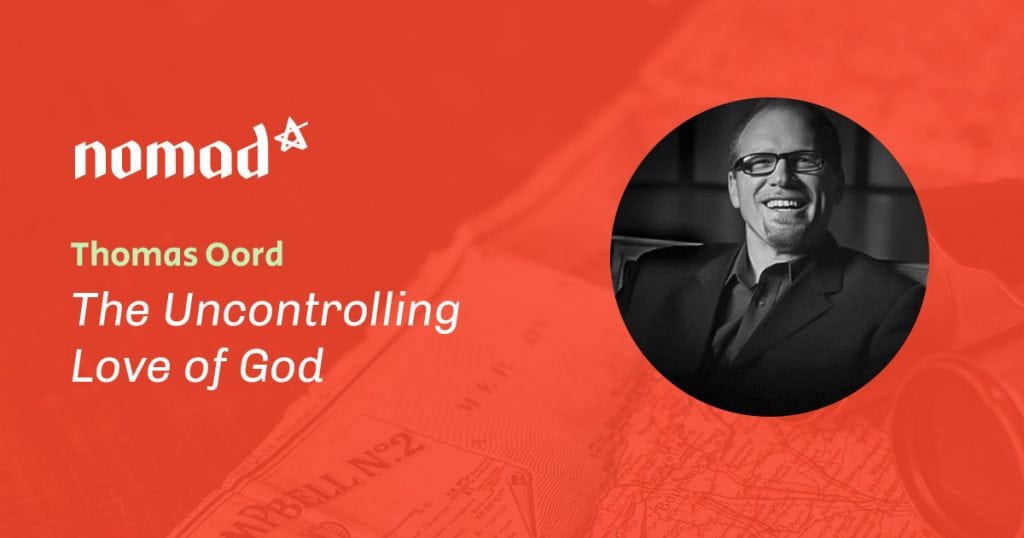Professor Thomas Oord has spent years wrestling with the problem of evil. Why, if God is all powerful and all loving, is there so much evil in the world? This question has brought Thomas to the edge of his faith. In recent years, though, he has begun to consider a radical solution. Perhaps God can’t stop evil? As shocking as this sounds, Thomas is careful to show how biblical this idea is, and just how much it looks like Jesus. Tune in for a mind bending episode!
Interview begins at 11m 21s

Image provided by Thomas Oord. Used with permission.
BOOKS
The Uncontrolling Love of God: An Open and Relational Account of Providence
God Can’t: How to Believe in God and Love after Tragedy, Abuse, and Other Evils
QUOTES
“If God really didn’t want something and God had the power to stop it – to prevent it – then God should do so, if God is perfectly loving. And so this idea of saying ‘God won’t stop evil’ ends up making God ultimately culpable for failing to prevent it. And so I’ve come to believe that we need to take the next step and say that God really can’t stop evil.”
“Open theology says that God cannot foreknow the future in its entirety. It says that God experiences time somewhat like we do. And that means that the future is really the future for God. And God can’t know with absolute certainty what will actually occur in the future because that is not yet knowable. God knows everything that’s happened in the past, God knows everything that’s happening in the present, God knows all the possibilities for the future. But until those possibilities become actual, God can’t know them as actual.”

8 Responses
I would think from my reading of scripture is that God controls things in such a way that some key individuals do not have a free will, so as to influence God’s ultimate plan for all others. So most everyone has free will to choose the good verses the evil, throughout their lives, e.g. Nineveh, but other’s have a pivotal role in shaping out the future for his plan e.g. Judas Iscariot. These pivotal individuals are protected from our free will.
Judas is an interesting one. Matthew 26:24 says ‘The Son of Man will go just as it is written about him. But woe to that man who betrays the Son of Man! It would be better for him if he had not been born.”
This makes it sound like Jesus’s betrayal was inevitable, but it wasn’t inevitable that Judas was the one who would betray him. Judas had freewill.
Peter was pretty certain that he had the free will no to deny his Lord, yet he denied him three times.
Yes, it certainly looks like Jesus knew Peter would betray him three times. I’m not sure that Jesus’s foreknowledge of this event has to imply a loss of Peter’s freewill.
It seems strange to me that God would take over Peter’s freewill and make him betray Jesus. Would God make someone sin? Doesn’t that make God culpable of sin himself? Would Peter be guilty of that sin, even though he didn’t chose to do it?
Seems more straightforward that Jesus simply predicted what Peter would do.
That interview was mind blowing and disconcerting. It really is hard to get my head round. Need at least another listen to I think. Thanks for the interview.
BTW, if you ever want to do an interview in Melbourne, Australia, our church would certainly give you a room!
It certainly was a mind bender! I read the book, read book reviews, listened to other interviews with Tom, and interviewed him myself, but I’m still struggling to get my head round it! Definitely worthy of a few more listens!
I’ll give you a shout next time we’re recording in OZ!
Tim
Interesting interview! I was reminded of C.S.Lewis’ explanation of miracles and in particular the water into wine (which Thomas Oord was struggling to fit into his theory), by saying that these kind of miracles are an acceleration of a natural process; water does turn into wine over time and with lots of natural intervention in the form of grapes, growth, sunshine etc. This helps miracles such as this fit into the uncontrolling love model. Just thought you’d be interested!
I also reflected that the problem of GRATITUDE is another problem if we don’t attribute actions to God; yes the problem of evil is a challenge to believing in God’s goodness, but the problem of whom to thank when life is good is just as significant of we don’t believe! (I can’t remember who coined the phrase the problem of gratitude – it’s not original!).
Thanks Pippa, that is interesting. C. S. Lewis’s explanation of miracles has certainly got me thinking! Tim